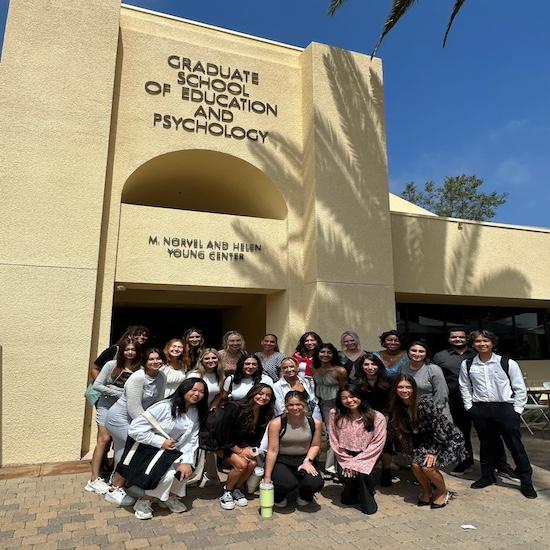50 Years of Excellence: Celebrating the MA in Clinical Psychology MFT Daytime Program

This fall, Pepperdine University Graduate School of Education and Psychology (GSEP) proudly celebrates the 50th anniversary of its MA in Clinical Psychology with an Emphasis in Marriage and Family Therapy (MFT) Daytime Format program — a legacy of preparing compassionate, highly skilled practitioners to serve communities across California and beyond.
The program began in 1975 on the Malibu campus as the MA in Community/Clinical Psychology under the leadership of Dr. Mae Keyson. Its early mission was to train practitioners for community mental health centers, which at the time were heavily supported by federal funding. As the landscape of mental health care evolved in the late 1970s, the program adapted to meet the growing demand for marriage and family counseling, adding the coursework needed for licensure as a Marriage, Family, and Child Counselor (MFCC).
Over the decades, visionary program directors and faculty leaders, including Drs. Tomas Martinez, Clarence Hibbs, and Dennis Lowe, guided the program through key transitions, from curriculum updates to licensure requirements, ultimately shaping the program into what it is today. In 1991, the official degree title was changed to MA in Clinical Psychology with an emphasis in Marriage and Family Therapy - Daytime Format reflecting the program's dual focus: providing a strong foundation in clinical psychology alongside specialized training in marriage and family therapy.
In 2003, the Daytime program moved to its current location in the GSEP building on the newly constructed Drescher Graduate Campus. This enabled the program to expand to enrolling two cohorts of students each academic year and allowed a naturally-occurring strong sense of community belonging to develop in this cohesive space. During this key transition, Cary Mitchell served as program director. Stephanie Woo served as program director from 2007-2022; a key development during this time was the revision and expansion of the curriculum to continue to meet requirements for the Marriage and Family Therapist license as well as the new Licensed Professional Counselor designation in California. Kathleen Eldridge became program director in the fall of 2022 and has served as an instructor in the program for 23 years along with many dedicated full-time and adjunct faculty members.
Since its inception, the Daytime program has graduated generations of clinicians who have gone on to pursue licensure, doctoral studies, and leadership roles across diverse professional fields. Their impact continues to ripple through communities worldwide.
What sets the Daytime format apart is its intentionally small, close-knit cohorts, which foster a strong sense of community and meaningful faculty-student relationships. By design, the program emphasizes rigorous academic study, supervised clinical training, and collaboration within a supportive learning environment — an approach that has defined its reputation for five decades.
“What sets this program apart is its unique cohort model. During my time in the master's program, I was part of a close-knit group of 25 individuals who continually inspired me with their passion and dedication,” shares Taylor Green, a recent Daytime program graduate and current PsyD candidate. “We learned from one another, supported each other's growth, and pushed each other to become the best professionals we could be.”
As GSEP reflects on this milestone year, the 50th anniversary of the Daytime program offers both a celebration of its legacy and a renewed commitment to preparing future generations of mental health professionals.